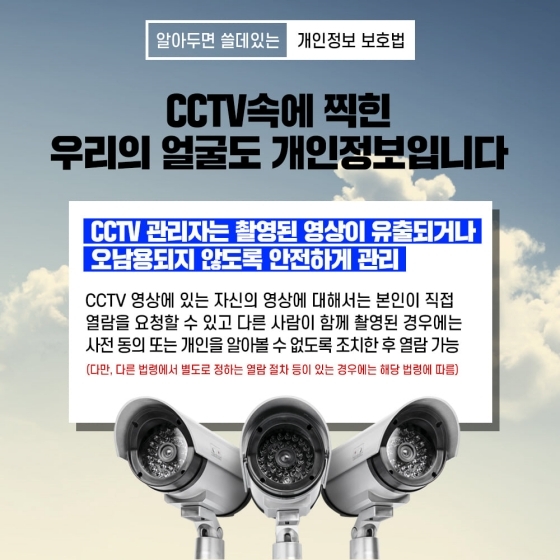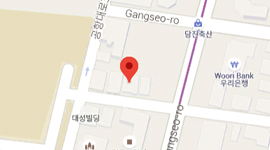Today, CCTVs record our daily lives throughout the city. However, while these records serve as a security measure, they also serve as a source of privacy invasion. Because even the smallest details—faces, license plates, and trademarks—can identify individuals, the South Korean government strongly demands the de-identification of CCTV footage.

Image: Republic of Korea Policy Briefing
AI-based mosaicking and de-identification technologies resolve this dilemma. Automated facial recognition and mosaicking technologies allow video footage to be used for security surveillance and monitoring, but without personally identifying individuals. This provides a practical means for public institutions to protect citizens while simultaneously fulfilling their legal responsibilities. In other words, personal information protection is not simply a function; it is the foundation for urban trust and a prerequisite for data utilization.
In Korea, the locations with the highest number of CCTVs (estimated order and figures) are subway stations and inside subway cars, with a total of approximately 20,000. In particular, local governments plan to install over 22,000 AI-based intelligent CCTVs in public spaces in Seoul alone by 2025, and approximately 20,000 existing CCTVs are also being converted to intelligent systems. Other locations include convenience stores, large supermarkets, and other commercial facilities, apartment complexes, around banks and ATMs, hospitals, educational facilities, and public institutions. Overall, over 17 million CCTV cameras are installed in approximately 3.2 million locations, demonstrating a growth rate of over 10% annually. This sector is particularly attractive to developing Asian countries as a potential business opportunity.
CCTV footage constitutes personal information and must be managed in accordance with the Personal Information Protection Act . When installing, signage must be posted and the purpose and scope of filming must be clearly stated. Unauthorized persons must not view or provide footage. Subjects of footage may request access to their own footage, and they can also request access to CCTV footage from public institutions through the Information Disclosure Portal.
Major cases of CCTV disputes include ▲refusal to view and invasion of personal information ▲invasion of privacy ▲provision to third parties without consent, etc., and these can be resolved through the Personal Information Protection Act, including the information subject's right to view, punishment provisions for provision to third parties without consent, and installation/operation restrictions. To resolve disputes, a request for dispute mediation can be made to the Personal Information Protection Commission, and when requesting access, the personal information processor is obligated to take de-identification measures.
CCTV de-identification is a technology that prevents personal information exposure and invasion of privacy by processing personally identifiable information such as faces and vehicle license plates in CCTV footage so that they cannot be recognized through methods such as mosaicking or blurring. According to the Personal Information Protection Act, when viewing CCTV footage, if another person is filmed in the footage, it must be provided after de-identification measures.
CCTV mosaicking refers to a technology or process that de-identifies personally identifiable information such as faces or vehicle license plates in CCTV footage to protect personal information. This technology prevents violations of portrait rights and privacy when disclosing CCTV footage for the public good, and a real-time automatic mosaic solution utilizing AI technology has also been developed to protect faces while safeguarding personal safety.
Mosaic.ai, MarketHub's big data AI mosaic platform, provides comprehensive insights into the CCTV and mosaic business, providing guidance on related businesses, products, services, and more, and creating new value. Specifically, it serves as a system that facilitates and connects interactions between suppliers and consumers (including VIA) and other groups in South Korea's CCTV AI mosaic industry.
Below are three examples of ADSOFT AI mosaic de-identification (human faces, vehicle license plates, and dynamic movements).
human face
vehicle license plate
dynamic movement
South Korea's Personal Information Protection Act presents a dilemma: whether you show it or not, you'll face lawsuits, and whether you don't, you'll face fines. In other words, individuals can personally access their own CCTV footage. If others are also filmed, they can access it only after obtaining prior consent or taking steps to obscure their identities.
APT : Experts say, “AI real-time mosaic is the only solution to protect both managers and residents” (2)
Bank : If CCTV is not checked immediately when cash such as passbooks and wallets are lost at the counter, it causes customer inconvenience and distrust (3)
School : Although schools are in a position to protect student safety, they are unable to fulfill their role due to legal and administrative burdens. (4)
Hospital : Medical institutions are particularly strict about personal information protection because they handle sensitive health information of patients, and violations can result in administrative sanctions and civil and criminal liability (5)
Hotel : CCTV installed to monitor accidents or crimes occurring in common areas such as hotel lobbies, hallways, elevators, and parking lots can sometimes expose guests’ sensitive personal information. (6)
Golf course : In various dispute situations such as unpleasant situations with caddies, accidents during rounds, and golf car accidents, if there is no CCTV or it is checked late, the operator is held responsible and trust decreases. (7)
Convenience stores : Disputes in blind spots where customers cannot see each other even in common areas such as cashiers, display cases, parking lots, and entrances where CCTV is installed (8)
Parking lot : Accidents occur If the confirmation of the city CCTV is delayed, both the victim and the management agency may be exposed to unnecessary inconvenience and disputes, and a situation may arise where the management agency is held responsible in the event of a legal dispute. (9)
Public : In the civil service office, there may be fights or verbal abuse between citizens, in public parking lots, there may be contact accidents or damage to vehicles, and in subways and roads, there may be traffic accidents and safety accidents. (10)
We introduce and connect related manufacturers and product businesses featured on the mosaic.ai platform to overseas markets. In particular, ADSOFT's CCTV AI mosaic business represents the most optimal example of a personal information protection solution. We ask for your interest.
Recruiting branch offices by country (field)
> Salesperson: obanglife@naver.com
> Manufacturer: ceo@adsoft.kr
> Platform: mail@mosaic.ai.kr
> Market Hub: mail@markethub.org www.mosaic.ai.kr









